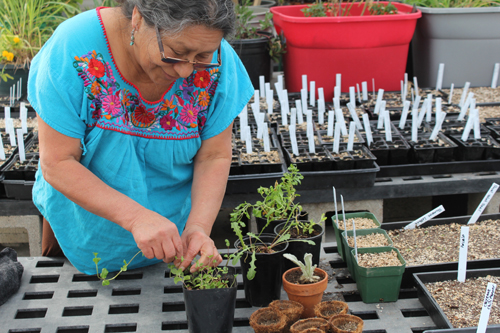As a descendent of generations of Mayan medicine women from Guatemala, Maria Marina Xoc Castillo de Vasquez has made it her goal to pass along her traditional ecological knowledge to students.
Marina, as her students call her, has been working at Northern Arizona University as a traditional knowledge scholar since 2005, passing along the knowledge she gained from her elders through teaching a class that focuses on traditional ethnobotany of indigenous peoples.
“I have knowledge of about 70 plants from my country. The same plants are being used here by many of the different tribes around Arizona,” Vasquez said. “We don’t realize it, but these are rich sources of protein, calcium, zinc, potassium and vitamins that are vital nutrients for human beings. I want to be able to pass down this knowledge to students at NAU.”
That approach is appreciated by students across ages and majors—her classes fill up quickly with undergraduate and graduate students of all ages from various programs. Most common are biology, chemistry, anthropology and environmental science students, but all backgrounds and majors are welcome to take the class.
“I’ve never made a flyer, but by the time I come back for the new semester I have the class full already,” Vasquez said. “I am so thrilled to know that there are young people who still value the ancient ways of our ancestors and want to learn more about how to take care themselves and help others.”
Senior modern languages major Madeleine Graham was told about the class by a friend because of her interest in organic farming.
“I think it’s been such a unique opportunity to be able to learn not just about every plant there is that’s medicinal, but specific ones to our region,” Graham said. “It’s a pretty special opportunity hearing from someone who has worked with the plant for decades and actually hearing about why it helps from personal history.”
Vasquez began her professional role at NAU in 2003 when she was hired to work as an aide for the relatively new Applied Indigenous Studies Program. She cooked for AIS classes during celebrations and was asked to weave traditional baskets for the first group of students to graduate from the program.
Being hired as a traditional knowledge scholar in the AIS Resident Elder Program in 2005 allowed Vasquez to serve as a guide and advocate for students and give public lectures for the community on topics related to spirituality, health, nutrition and relationships. Soon she was sharing her grandmother’s knowledge of healing to students focused on indigenous peoples of the world in the Abya Yala Club.
Eventually the club got a new advisor, but Vasquez continued working with students outside of class until she was given an AIS class to teach. There, she lectured about medicinal plants and foods, fermentations, and making salves, tinctures, poultices, facial creams and deodorants, all of which are made in the classroom.
Vasquez said she hasn’t always felt this way about her work. In fact, she was less than excited as a child when her grandmother first began sharing medicinal teachings with her.
“When I was a young girl I hated it that she never was at home. She was always going to heal somebody else and I thought that wasn’t for me,” Vasquez said.
Vasquez originally came to the United States to marry Miguel Vasquez, now a professor of anthropology at NAU. Her desire to teach Spanish brought her to NAU for a degree in bilingual/multicultural education, to be able to teach high school and college in Flagstaff. After 15 years of teaching Spanish in local schools, Marina returned to NAU to share her traditional knowledge.



